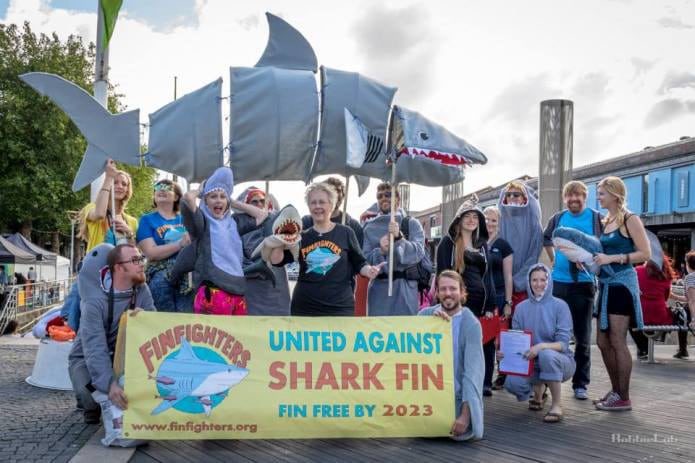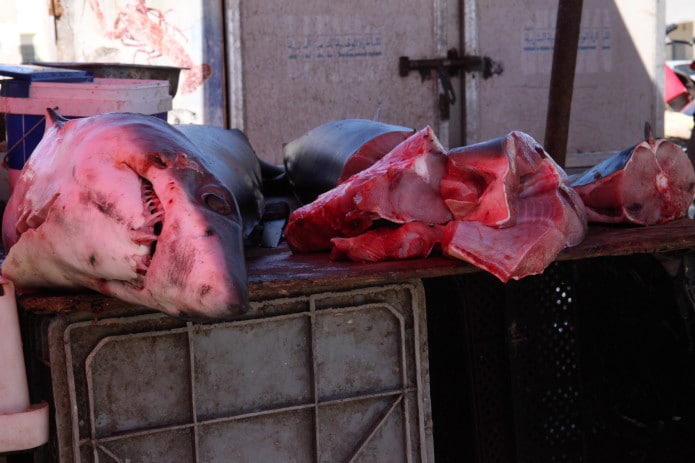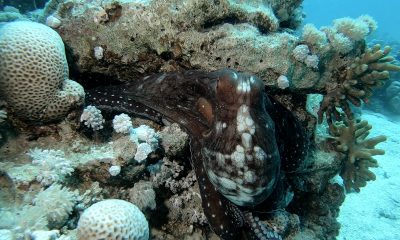News
SHARKS: IN DEEP WATER – a film to change things (Watch Trailer)

Join a journey to SAVE SHARKS and EXPOSE TRUTHS closer to home than you ever imagined possible.
Jeff Goodman talks with film-maker Matt Brierley about the film he is making to help save the world’s sharks. The film is half completed but Matt needs help and support to finish it. Details for the film can be seen here.
‘SHARKS: IN DEEP WATER is a documentary adventure to save the world’s greatest predators – sharks. We’re all accidental accomplices in the ocean’s greatest wildlife massacre… and you need to know how. A film to save sharks. To save oceans. To save us all.’ Watch there trailer here:
Matt sent me the above link to this important film in the hope we could help publicize his crowd-funding campaign to finish the film. I watched the trailer and was only too pleased to help. Sharks, as with all other marine species around the world, are in grave danger of extinction and it is all down, one way or another, to us, human beings. We talk about conservation and prevaricate about the issues without actually having any real positive effect. We are quickly and irrevocably eating and plundering our way through the world and putting nothing back in place except things like plastic and carbon dioxide.
Of course there are a few good news stories and successful conservation campaigns that have temperately saved certain species, but in the big picture we are losing these incredible animals to our greed and lack of understanding.
I asked Matt how he first became interested in the marine world and ultimately sharks.
Matt: As a kid the seaside was Blackpool, Lancashire… and Blackpool beach was an oily mess! So, my love of oceans was lived vicariously through TV programmes. The Trials of Life sequence where killer whales smashed up onto a Patagonian beach to grab sea lions particularly fired my imagination. Sharks happened accidentally. I won a round the world trip on Virgin radio and found myself, improbably, in South Africa and underwater, ogling a Great White from behind the bars of a cage. Witnessing such majesty was the start of debunking all that Jaws paranoia an eighties childhood gave me.
Jeff: Was there a single defining moment when you told yourself I need to do something about this?
Matt: Bearing witness to death and destruction in Morocco was incredibly hard – once you see it with your own eyes you realise that you have to try and fix it. We were keen to mercury test to show bioaccumulation of heavy metals on camera, so bought a random mako steak. It was, predictably, toxic. If that shark had heavy metals in it, then the implication was clear, the whole NE Atlantic was a toxic soup. That’s a very big thought. So, I’d just returned from filming all this awfulness, when news broke that filmmaker Rob Stewart had been lost in a diving accident. I’m the same age and there was just this terrible feeling that if sharks had lost Rob’s voice, who in the filmmaking community was picking up the gauntlet?
Jeff: You are featuring the work of the Shark Conservation Organisation ‘Fin Fighters’ and as such are working with a very dedicated group of people. Can you tell me a little more about them?
Matt: Fin Fighters is really a state of mind. Lou Ruddell, the founder, explains Fin Fighters as “a group of dedicated, shark advocates, but also everyday people from all walks of life, coming together to protect what we love, wanting to show that everybody can make a difference by applying their skills, whatever they are, to help protect the oceans and the incredible species we share this world with.” I subscribe to Lou’s ethos – if you decide to make a change, you can make a change, especially in the digital age. Just tweet your MP! Fin Fighters came into being when Lou saw shark for sale in Cambridge. Cambridge subsequently became the UK’s first fin free city thanks to Lou’s tenacity. Fin Fighters has brought together scientists and non-scientists for the greater good of sharks – I find that really new and refreshing.
Jeff: Your journey seems to have started in Morocco where you saw a Great White shark for sale. What were your initial feeling when you saw this.
Matt: Disbelief. It had been filmed by Lou whilst undercover previously, so I was seeing this footage and just thinking: this is absolute madness. Then I interrogated the legality and I couldn’t find any wrongdoing. Even though Great Whites are CITES listed, Appendix II allows domestic trade. To me that shows something is really broken. That was the catalyst for going out to document the situation in Morocco in more detail. It was also the trigger to really use the film to question the difference between endangered and protected. How can it be legal to eat CITES and red listed sharks?
Jeff: At the time you were with others who would be able to take genetic samples. Why was this important?
Matt: When the Great White was filmed, Lou didn’t have any geneticists with her. However, when I filmed undercover, we were joined by Sam Hook from Manchester University. There are many things DNA can tell us – firstly, what a species is if that species has been rendered unrecognisable. Secondly, if you know what species you are sampling, that feeds into a database that can be used by future scientists to ID unrecognisable species – think dried fins for example. Thirdly, you can begin to map distributions – for example, we now know a subpopulation of Bigeye Thresher shark has a distribution stretching from Tangier, Morocco, around the whole of Africa, to the Indian Ocean. That’s a new scientific discovery. If DNA hadn’t been taken in both locations we would never have known.
Jeff: Did you encounter any anger or resistance from local fishermen?
Matt: No. As a filmmaker, far from it. In fact, their willingness to be filmed really showed how little they understood about the legality of their behaviour and what work needs to be done in that regard. On the very last night I was laid down on the floor of a fish market in absolute filth to capture footage of dismembered shark heads. Four guys pulled up in a van and started shouting at me in Arabic, and I really thought I was in serious trouble. However, they were calling me over to film them unloading a Bigeye Thresher. That’s totally illegal! It goes to show, the fishermen need education, not condemnation.
Jeff: Could you tell me more about the team you are working with and what their roles are?
Matt: In Morocco, Lou and Sam were primary characters… now we’re cutting the part of the film that shows the problems in the Western world, there’s me [cameraman, editor, producer and unexpected character in the film!] and tour de force underwater cameraman Robbie Labanowski whose joined me in shooting and editing.
Jeff: In your email to me you mentioned the revelation that in the UK we have a domestic trade in sharks; that we permit shark fins to be imported on a per person basis to a fixed weight limit; that it’s more-often-than-not totally legal to sell species that the IUCN list as sharks threatened with extinction – including Endangered Spiny Dogfish which is turning up in our fish and chips sold under the confusing name of ‘rock’, ‘rock salmon’ or ‘huss’. Do you think many people in the UK have any idea this is happening?
Matt: Thankfully I’ve been filming with a shark scientist named Dr. Andrew Griffiths whose worked hard with his colleagues at Exeter University to blow the lid on it and had some successes very recently with headlines… but, even so, the short answer is no. I especially object to ‘rock salmon’ as a term, it’s very, very misleading. Then we have the complexity that these names can apply to a number of different sharks!! What I find most alarming though, is the consumption of Endangered wildlife on the high street. It’s the equivalent of buying a mountain gorilla from a butcher, but because it’s fish, it’s out of sight, out of mind.
Jeff: You also mentioned in the email that very recently Shortfin Mako was declared Endangered and it took you only three minutes to google it and find steaks for sale online. How did you feel about this and where were these steaks being sold from?
Matt: It’s bleak. Really bleak. It was a UK exotic meat trader – there is little point naming and shaming because… it’s completely legal! That is something I am desperate to have discussed in the film. Imagine if when the IUCN declared something was threatened with extinction that animal was immediately protected. Surely as a species that’s a reasonable thing for humanity to aim towards? As stands we just acknowledge the animal is on its way out, and in the case of sharks we continue to eat them. Sad.
Jeff: Are there other discoveries you have made within in the UK?
Matt: It has been a real learning journey for me – I didn’t expect to find a Critically Endangered shark for sale nine minutes from my front door. I didn’t know hammerheads have been landed at UK ports legally. There are some other seismic shocks specific to the UK in the film – but news needs to break later to have maximum impact.
Jeff: Can you tell me why it is important for us to try and save sharks. Why should people take an interest in this and what could they do to help or make a difference?
Matt: It sounds strange that sharks protect fish – but, let’s take one example – Jamaica. They took out their sharks, so fish numbers exploded. There were so many fish they ate all the coral. The reef then collapsed. Huge swathes of Jamaican ocean are algal dominated reef skeletons devoid of life. Without a reef, there goes your diving, your breakwater against storms, your local fishing businesses. Sharks also eat diseased fish: you can expect disease to sweep through whole fish stocks if you don’t have a predator tidying up the sick ones. In Ecology we’re increasingly understanding top predators stabilise ecosystems. It’s like the story that reintroduced wolves in Yellowstone created rivers: they ate deer, trees grew, beavers cut them down, built dams, new watercourses began to run. Nature is complicated, we can’t even begin to imagine the dreadful waves of destruction we’re creating by taking away the shark mafia!
Jeff: Other than making your film what else are you doing or involved with to help promote and ultimately stop this insane fishery?
Matt: Making a film like this is all encompassing, there is no time for anything beyond giving the sharks the voice they deserve, especially when you have no financial reserves to speed things along. This crowdfunder will help us win the race against extinction and shine light on issues today instead of when it is too late. I am frightened how much the situation for sharks has worsened even in the short time I have been making the film.
Jeff: Thanks Matt for getting in touch and I wish you all success with the crowd funding to finish this extremely important film. Please keep in touch when you are able to start filming again and let me know how it is developing.
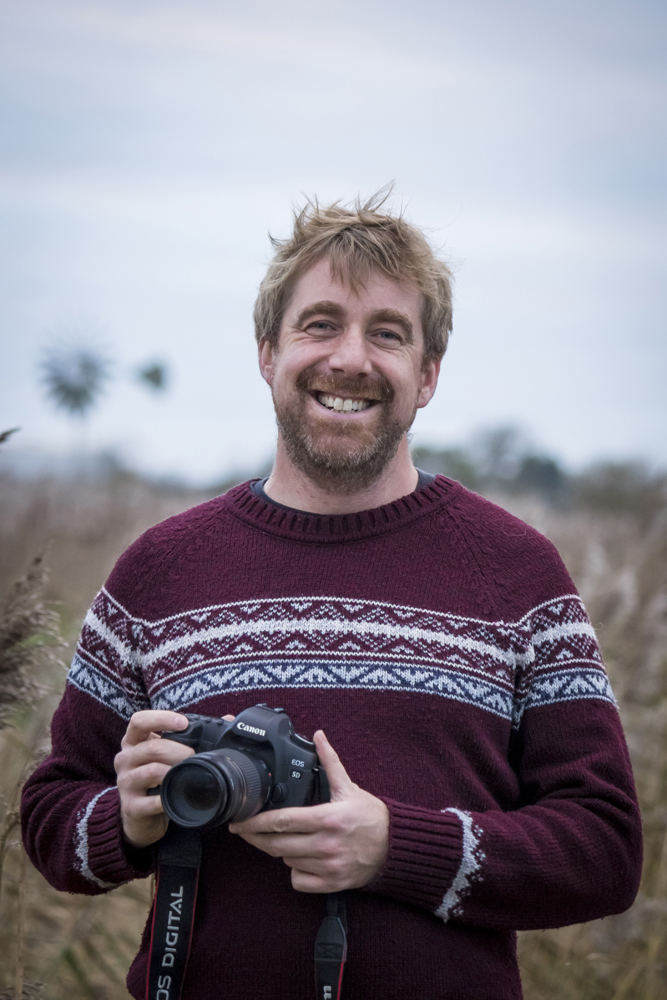 Matt Brierley is both a conservationist and a wildlife filmmaker. Currently he works part time inspiring primary children for Butterfly Conservation whilst dedicating the rest of his time to making Sharks: In Deep Water. Matt spent five years at the BBC Natural History Unit honing his craft, working his way from Researcher to Edit Producer on shows including Springwatch, Planet Earth II and Blue Planet II. “The BBC is great at inspiring people in the first instance,” Matt explains, “but online providers, like Netflix, are paving the way for more involved conservation films and Sharks: In Deep Water is one of the greatest untold stories of our time. Not finning in far away lands, but a story much closer to home – a British, European and American trade in shark meat and fin – from animals listed as threatened with extinction. Much of it is entirely legal and it is happening on an epic scale and on our watch. The reality is people are eating toxic and endangered sharks. Then there’s the trade in Morocco – problematic in its own right, but also a European problem as we’re buying their sharks. Things need to change: awareness, behaviours, policy. Our film, if our crowdfunding is successful, can really highlight the problems and propose solutions.”
Matt Brierley is both a conservationist and a wildlife filmmaker. Currently he works part time inspiring primary children for Butterfly Conservation whilst dedicating the rest of his time to making Sharks: In Deep Water. Matt spent five years at the BBC Natural History Unit honing his craft, working his way from Researcher to Edit Producer on shows including Springwatch, Planet Earth II and Blue Planet II. “The BBC is great at inspiring people in the first instance,” Matt explains, “but online providers, like Netflix, are paving the way for more involved conservation films and Sharks: In Deep Water is one of the greatest untold stories of our time. Not finning in far away lands, but a story much closer to home – a British, European and American trade in shark meat and fin – from animals listed as threatened with extinction. Much of it is entirely legal and it is happening on an epic scale and on our watch. The reality is people are eating toxic and endangered sharks. Then there’s the trade in Morocco – problematic in its own right, but also a European problem as we’re buying their sharks. Things need to change: awareness, behaviours, policy. Our film, if our crowdfunding is successful, can really highlight the problems and propose solutions.”
For more information about the film and how you can help please click here.
News
Dive Worldwide Announces Bite-Back as its Charity of the Year

Over the next 12 months, specialist scuba holiday company Dive Worldwide will be supporting Bite-Back Shark & Marine Conservation with donations collected from client bookings to any one of its stunning dive destinations around the world. The independently-owned operator expects to raise £3000 for the UK charity.
Manager at Dive Worldwide, Phil North, said: “We’re especially excited to work with Bite-Back and support its intelligent, creative and results-driven campaigns to end the UK trade in shark products and prompt a change in attitudes to the ocean’s most maligned inhabitant.”
Bite-Back is running campaigns to hold the media to account on the way it reports shark news along with a brand new nationwide education programme. Last year the charity was credited for spearheading a UK ban on the import and export of shark fins.
Campaign director at Bite-Back, Graham Buckingham, said: “We’re enormously grateful to Dive Worldwide for choosing to support Bite-Back. The company’s commitment to conservation helps set it apart from other tour operators and we’re certain its clients admire and respect that policy. For us, the affiliation is huge and helps us look to the future with confidence we can deliver against key conservation programmes.”
To launch the fundraising initiative, Phil North presented Graham Buckingham with a cheque for £1,000.
Visit Dive Worldwide to discover its diverse range of international scuba adventures and visit Bite-Back to learn more about the charity’s campaigns.
MORE INFORMATION
Call Graham Buckingham on 07810 454 266 or email graham@bite-back.com
Gear News
Scubapro Free Octopus Promotion 2024
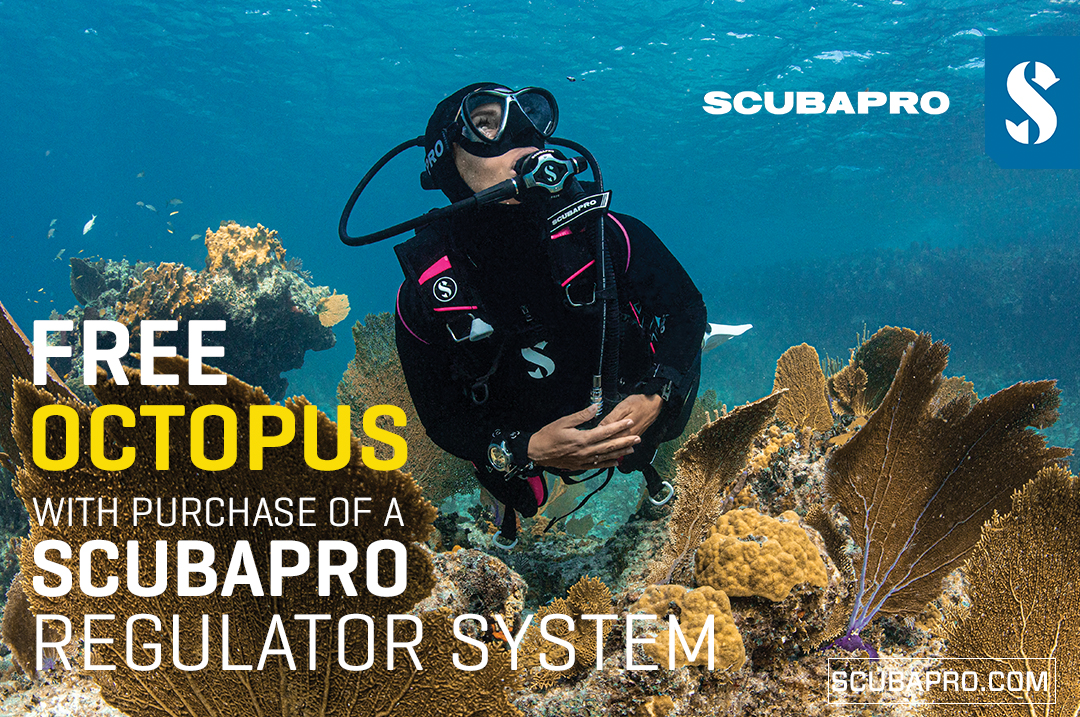
Free Octopus with every purchase of a SCUBAPRO regulator system
Just in time for the spring season, divers can save money with the FREE OCTOPUS SPRING PROMOTION! Until July 31st SCUBAPRO offers an Octopus for free
with every purchase of a regulator system!
Get a free S270 OCTOPUS with purchase of these combinations:
MK25 EVO or MK19 EVO with A700
MK25 EVO or MK19 EVO with S620Ti
MK25 EVO or MK19 EVO with D420
MK25 EVO Din mit S620Ti-X
Get a free R105 OCTOPUS with purchase of the following combinations:
MK25 EVO or MK19 EVO with G260
MK25 EVO or MK17 EVO with S600
SCUBAPRO offers a 30-year first owner warranty on all regulators, with a revision period of two years or 100 dives. All SCUBAPRO regulators are of course certified according to the new European test standard EN250-2014.
Available at participating SCUBAPRO dealers. Promotion may not be available in all regions. Find an authorized SCUBAPRO Dealer at scubapro.com.
More information available on www.scubapro.com.
-

 News3 months ago
News3 months agoHone your underwater photography skills with Alphamarine Photography at Red Sea Diving Safari in March
-

 News3 months ago
News3 months agoCapturing Critters in Lembeh Underwater Photography Workshop 2024: Event Roundup
-

 Marine Life & Conservation Blogs3 months ago
Marine Life & Conservation Blogs3 months agoCreature Feature: Swell Sharks
-

 Blogs2 months ago
Blogs2 months agoMurex Resorts: Passport to Paradise!
-

 Blogs2 months ago
Blogs2 months agoDiver Discovering Whale Skeletons Beneath Ice Judged World’s Best Underwater Photograph
-

 Gear Reviews2 weeks ago
Gear Reviews2 weeks agoGEAR REVIEW – Revolutionising Diving Comfort: The Sharkskin T2 Chillproof Suit
-

 Marine Life & Conservation2 months ago
Marine Life & Conservation2 months agoSave the Manatee Club launches brand new webcams at Silver Springs State Park, Florida
-

 Gear Reviews3 months ago
Gear Reviews3 months agoGear Review: Oceanic+ Dive Housing for iPhone


